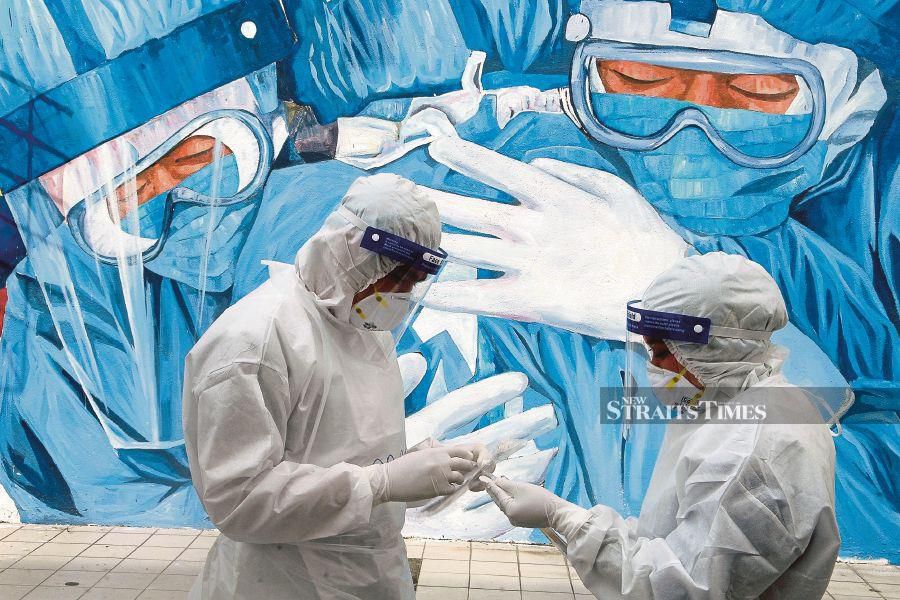
KUALA LUMPUR: While the move by private companies to secure Covid-19 vaccine distributorship is seen as a way to allow more Malaysians to be vaccinated, it may also lead to a reduction in vaccine supply to the government.
Experts say the purchase by private companies could interfere with the government's procurement of 25 million doses of Pfizer-BioNTech vaccines next month to inoculate 39 per cent of the population this year.
Sunway University Business School of Economics Professor Dr Yeah Kim Leng said the increased vaccine demand caused by the entry of more buyers in the international market would bid up prices and might result in hoarding, thereby disrupting the government's procurement plan in terms of cost, delivery or rollout.
"If it involves protracted and complex negotiations, supplies to the government may be slowed down, especially if the vaccine producers prioritise buyers that pay higher prices or order large quantities.
"The government would then need to engage with the vaccine manufacturers directly as private purchasers are willing to pay more (and the government may have to wait longer). The government could also leverage on government-to-government relationships in cases involving state-owned enterprises.
"Given that the government already possesses information on vaccine prices from the various manufacturers, as well as those in other countries, it is in a better position to negotiate with private purchasers to ensure that the profits are not excessive.
"Instituting open tenders and ensuring transparency and full disclosure by the government can help to curb leakages and abuse in the procurement contracts," he told the New Straits Times yesterday.
Dr Yeah said it was understandable that many private companies were jumping onto the bandwagon to be Covid-19 vaccine distributors as the government had announced a RM3 billion allocation for vaccination.
He said even companies in unrelated industries would be interested in getting a piece of the pie, where the business opportunity basically involved the ability to secure the vaccines in the international market and profit from the mark-ups.
He added that arranging for the logistics and vaccination rollout, if included, were services that could be provided through sub-contracting.
"If the involvement of private sector helps to reduce the overall costs to the government and achieve the desired coverage of the population quicker, then it is a welcome public-private partnership.
"But if there are leakages and arrangements that enrich the selected firms, then it should not be allowed."
In December last year, Science, Technology and Innovation Minister Khairy Jamaluddin reportedly told the Dewan Rakyat that the government had directly procured Covid-19 vaccines with pharmaceutical company Pfizer under the Covax Facility without the involvement of middlemen.
He said arrangements by private companies to secure the vaccines were purely commercial deals that had nothing to do with the government, but required the National Pharmaceutical Regulatory Agency's (NPRA) approval.
With global vaccine manufacturing capacity and economies of scale ramped up, Dr Yeah opined that prices were expected to decline.
"In addition, as more vaccines by different manufacturers are approved, there will be opportunities for firms to ink new distributorships as long as the Covid-19 threat persists and the population is not vaccinated to the desired extent."
Epidemiologist Professor Datuk Dr Awang Bulgiba Awang Mahmud said Malaysia could face a slow rollout if the government was procuring the same vaccines as the companies.
Dr Awang Bulgiba, who is the Science, Technology and Innovation Ministry's head of Independent Covid-19 Vaccination Advisory Committee, also expressed concern over companies independently acquiring vaccine distributorship.
It could affect the government's efforts to monitor the vaccine's effectiveness, its side effects and who had or had not been vaccinated, he said.
"This may pose complications. We would not be sure if we have reached the proposed herd immunity threshold if there is no central monitoring. We cannot compute the actual effectiveness of these vaccines, and an immunity or vaccine passport will be difficult to create.
"If the government does not have data on these vaccines, there will be uncertainty about the overall vaccination achievement in the country.
"Private healthcare facilities are unlikely to be part of a central monitoring mechanism unless the government mandates this.
"Some kind of mechanism needs to be worked out by the government, and fast, before more companies jump in and start to make things more complicated."
Another concern, he said, was how the vaccines were handled, as well as the adverse effects after one had received them.
"The patient's condition has to be observed. If these vaccines do not require ultra-low temperature freezers and can just use the normal cold chain, this is not a problem for healthcare facilities, which monitor their cold chain.
"But for smaller clinics that do not monitor this cold chain properly, vaccines can degrade if not stored properly.
"Covid-19 vaccines are new vaccines and monitoring for side effects is absolutely essential. Should adverse events happen in these vaccinees, there may not be a proper investigation and these adverse events may be exploited by anti-vaxxers."
Melaka Manipal Medical College Community and Occupational Medicine Professor Dr G. Jayakumar, on the other hand, said the purchase by private companies should be viewed as complementing the government's effort to vaccinate the population.
The distribution of vaccines, he said, should be managed by healthcare providers from either the government or private sector. However, he cautioned that the government must regulate the process with checks and balances to weed out opportunist companies, adding that if there was no regulation, more companies would rush in to have a bite of the profit pie at the expense of the population's wellbeing.
Dr Jayakumar also felt capping the price of vaccines was another way to prevent the system from being abused. - NST


No comments:
Post a Comment
Note: Only a member of this blog may post a comment.